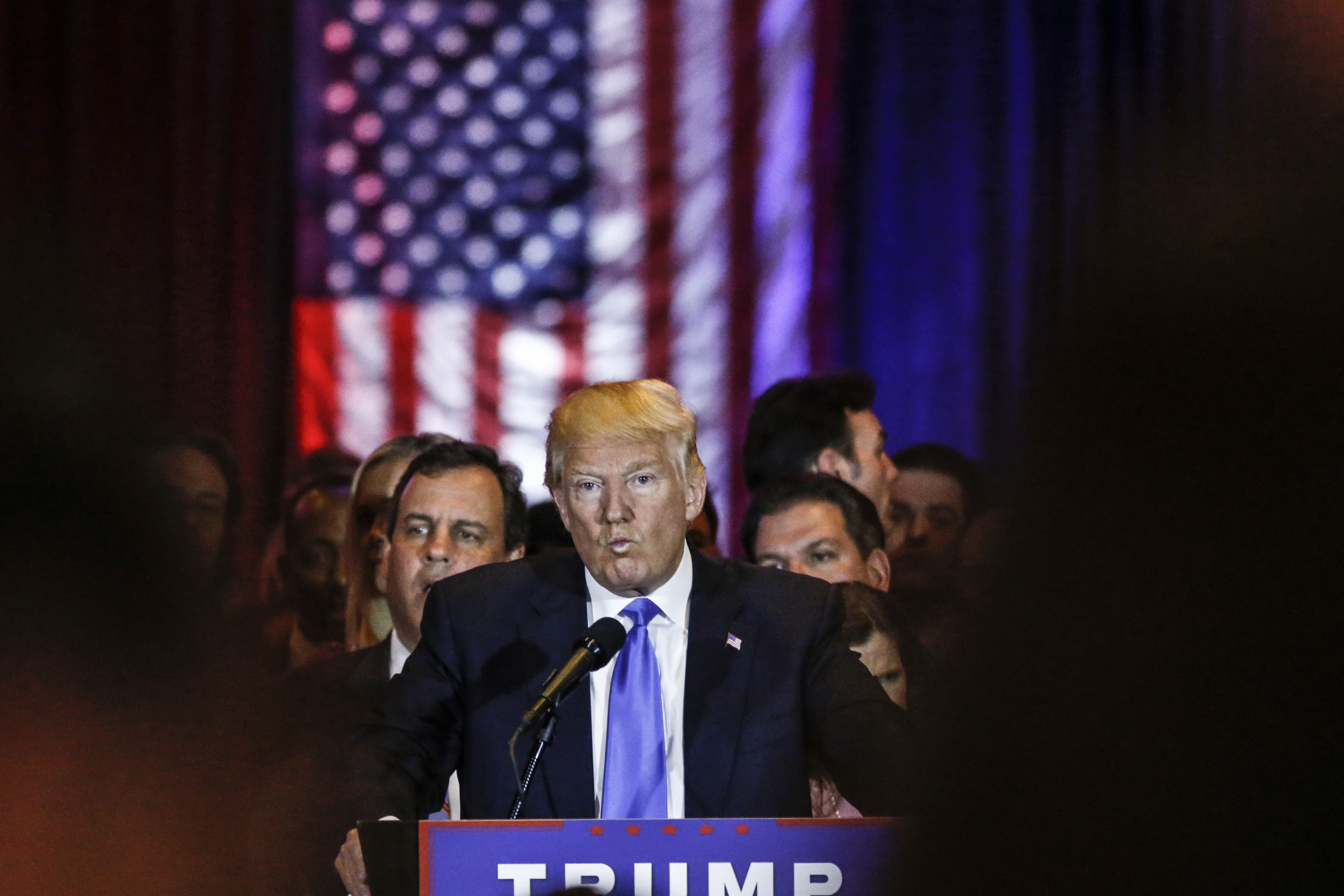Why Donald Trump will doom Republicans' Senate majority
Time for Republicans to start freaking out about the Senate


A free daily email with the biggest news stories of the day – and the best features from TheWeek.com
You are now subscribed
Your newsletter sign-up was successful
Donald Trump basically wrapped up the Republican presidential nomination on Tuesday when his dominating win in the Indiana primary knocked rival Ted Cruz out of the race. And while many Republicans are worried that Trump will deep-six the party's chances at retaking the White House, Republican senators are reportedly in a state of denial about what he means for the other big 2016 showdown: the battle for Congress.
They should wise up, fast.
While Democrats' hopes for retaking the House are still slim, their chances in the Senate look increasingly good. Let's walk through why.
The Week
Escape your echo chamber. Get the facts behind the news, plus analysis from multiple perspectives.

Sign up for The Week's Free Newsletters
From our morning news briefing to a weekly Good News Newsletter, get the best of The Week delivered directly to your inbox.
From our morning news briefing to a weekly Good News Newsletter, get the best of The Week delivered directly to your inbox.
The electoral success of individual senators has become increasingly dependent on how their home states vote in presidential years. This does not bode well for Republican senators, poised to ride the coattails of a nominee viewed unfavorably by almost 64 percent of voters.
In fact, most polls about the general election should be deeply concerning for the GOP. Trump not only loses to Hillary Clinton in nearly every general election matchup, he fares poorly in those states where Republican senators are most vulnerable, like Pennsylvania, New Hampshire, and Wisconsin.
This could easily cost the GOP the Senate. Republicans hold 54 seats to the Democrats' 46 (including independents Angus King of Maine and Bernie Sanders of Vermont, who caucus with the Democrats), meaning the latter needs a net pickup of nine seats to wrest control of the Senate.
And even before the Trump phenomenon, Democrats held the advantage: Twenty-four of the 34 seats up for reelection in November are being defended by Republicans, many of them from states that President Obama won in 2012. Plus, Democratic turnout is typically much higher during presidential years than in midterm elections.
A free daily email with the biggest news stories of the day – and the best features from TheWeek.com
But with Trump as the presumptive nominee, Republicans' difficult map becomes even harder.
Take Sen. Mark Kirk (R-Ill.). He's widely thought to be the most vulnerable of the Republican incumbents up for reelection in 2016. Even his liberal views on abortion and gay marriage have not changed the perception that he won't be returning to the Capitol in January. His Democratic opponent — Rep. Tammy Duckworth — is an Iraq War veteran who lost both her legs overseas, a war hero narrative that writes itself.
She has also deftly played the Trump card. In response to Kirk's recent joke that — in protest of Trump — he would skip the Republican National Convention to "make sure that my hair is just perfect," the Duckworth campaign responded by putting out a Photoshopped image of Kirk sporting Trump's hair, aimed at reminding voters that both Republicans will be on the same ballot.
"Republican Mark Kirk can hide from the Republican presidential convention but he can't hide from his pledge to put loyalty to the Republican Party first and back Donald Trump when he is the GOP nominee," said Duckworth's campaign manager, managing to insert the words "Republican" or "GOP" four times in a single sentence. This line of attack seems to be working — even Kirk's own internal polling finds him trailing Duckworth, 43 percent to 40 percent.
In Ohio, GOP presidential politics are likewise having an effect on the party's Senate calculus. As Amber Phillips of The Washington Post points out, incumbent Sen. Rob Portman — facing a Democratic challenge from former Gov. Ted Strickland — recently opened himself up to flip-flopping charges when he reneged on his support for the Trans-Pacific Partnership, a sprawling trade pact with 11 other countries for which he voted for fast-track approval rules. Though Ohio has seen an outflow in manufacturing jobs, Portman, a former trade ambassador, more likely changed his tune because of the anti-trade sentiment being fanned by Trump.
In addition to the flip-flop charge, Strickland's campaign has also kept Trump front and center, repeatedly highlighting Portman's decision to back whoever the Republican nominee is. In what is expected to be one of the tighter races, Strickland leads Portman by only a single percentage point, a recent PPP poll found.
New Hampshire is another state where Democrats are looking to flip a Senate seat, and like Portman and Kirk, incumbent Republican Kelly Ayotte hasn't been able to escape the specter of Trump. Her challenger — Gov. Maggie Hassan (D) — is co-opting the same playbook as her fellow Democratic challengers, a strategy that one of her campaign operatives summed up by saying, "It's just easy to paint a picture that [Ayotte]'s one of them, of that extreme right wing of the Republican Party."
The Senate contest in the Granite State is unique in that, as a race between two women, Trump's misogynist rhetoric becomes even more salient a campaign point. Case in point, the Hassan campaign was quick to jump on Trump's claim that the only reason Clinton is in the race is because she's a woman. In a press release, Hassan's press secretary attacked Ayotte for not "denouncing" "Trump's offensive, anti-woman behavior."
Numerous polls have Ayotte just barely ahead, a lead that could disappear dramatically once Trump officially secures the nomination.
GOP incumbents also have difficult reelection campaigns in states like Wisconsin and Pennsylvania, where Sen. Ron Johnson and Sen. Pat Toomey are on Democrats' watch list. Johnson is already losing — rather widely according to a recent Wisconsin poll, which finds Democrat Russ Feingold (who Johnson beat in 2010) a 10-point favorite to regain his seat. Factor in competitive open contests in states like Florida and Nevada, and then throw in a wildcard like Arizona, Colorado, or Missouri, and the Republican Party's Senate outlook looks even more grim.
Nine-seat pickups don't come every election cycle. But as the presence of Trump constantly reminds us, we've never seen anything like 2016 before.
Benjamin Shull is an assistant books editor with The Wall Street Journal and a contributor to The Week. Follow him on Twitter.
-
 The world’s most romantic hotels
The world’s most romantic hotelsThe Week Recommends Treetop hideaways, secluded villas and a woodland cabin – perfect settings for Valentine’s Day
-
 Democrats push for ICE accountability
Democrats push for ICE accountabilityFeature U.S. citizens shot and violently detained by immigration agents testify at Capitol Hill hearing
-
 The price of sporting glory
The price of sporting gloryFeature The Milan-Cortina Winter Olympics kicked off this week. Will Italy regret playing host?
-
 The billionaires’ wealth tax: a catastrophe for California?
The billionaires’ wealth tax: a catastrophe for California?Talking Point Peter Thiel and Larry Page preparing to change state residency
-
 Bari Weiss’ ‘60 Minutes’ scandal is about more than one report
Bari Weiss’ ‘60 Minutes’ scandal is about more than one reportIN THE SPOTLIGHT By blocking an approved segment on a controversial prison holding US deportees in El Salvador, the editor-in-chief of CBS News has become the main story
-
 Has Zohran Mamdani shown the Democrats how to win again?
Has Zohran Mamdani shown the Democrats how to win again?Today’s Big Question New York City mayoral election touted as victory for left-wing populists but moderate centrist wins elsewhere present more complex path for Democratic Party
-
 Millions turn out for anti-Trump ‘No Kings’ rallies
Millions turn out for anti-Trump ‘No Kings’ ralliesSpeed Read An estimated 7 million people participated, 2 million more than at the first ‘No Kings’ protest in June
-
 Ghislaine Maxwell: angling for a Trump pardon
Ghislaine Maxwell: angling for a Trump pardonTalking Point Convicted sex trafficker's testimony could shed new light on president's links to Jeffrey Epstein
-
 The last words and final moments of 40 presidents
The last words and final moments of 40 presidentsThe Explainer Some are eloquent quotes worthy of the holders of the highest office in the nation, and others... aren't
-
 The JFK files: the truth at last?
The JFK files: the truth at last?In The Spotlight More than 64,000 previously classified documents relating the 1963 assassination of John F. Kennedy have been released by the Trump administration
-
 'Seriously, not literally': how should the world take Donald Trump?
'Seriously, not literally': how should the world take Donald Trump?Today's big question White House rhetoric and reality look likely to become increasingly blurred
